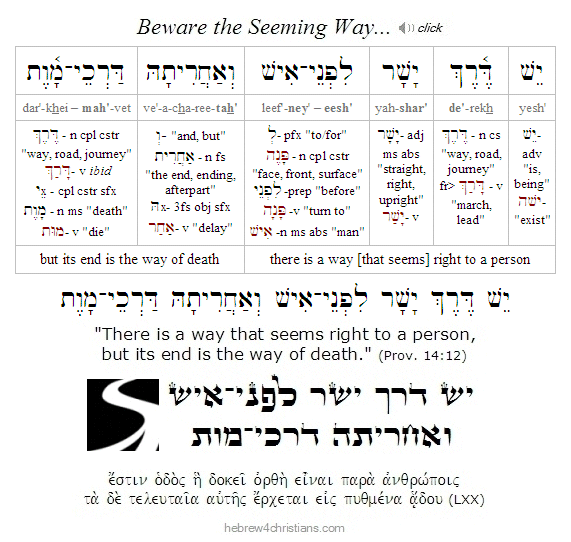|
Most of us instinctively want to live life to the fullest, and we make choices that we believe will satisfy our profound hunger for life. Even choices which appear to be self-loathing are often made with the hidden hope that we will find satisfaction in some way.
So there is a way, or road, that you are walking, comprised of a (finite) series of choices you have made, are making, and will make, which are leading you somewhere. You cannot get off this road, and no one can walk it for you. Since this road represents the way of your life, you are ultimately responsible for how you choose to walk it. You are not free to choose the "what" of your journey (which is a brute fact), but you are free to choose its "how."
Notice that in the original Hebrew text of this verse, the word "seems" was added by the translators. Literally the verse reads, "There is a way (that is) right before a man, but its end is the way to death." The translators here assumed (and correctly so) that if this "way that is right before a man" actually is one of the ways of death, then it must only seemingly be a right way, and not the genuine way of righteousness after all. Note further the qualifying phrase, "before a man." Since there are ways that seem right before one's eyes but are in fact not, then it follows that there are false ways that we can walk, which the Scripture ominously describes as the "ways of death."
In other words, we can think we are on the "right way" but actually be on the road to death. The Hebrew word translated "right" is the word yashar (×ָש×ָר) which can also be translated as "straight" (as in a straight line). Interestingly, if we render the verse more literally, "there is a way straight before a man, but the end thereof are the ways of death," the verse might be suggesting that restricting our awareneess to the obvious, intuitive, and more immediate forms of experience is literally a dead-end on the spiritual path. In other words, by limiting our experience to the realm of the "empirical," we can fool ourselves into thinking we are walking the "straight road" when we are actually treading a road that leads to death itself (Matt 7:13-14).
How can this be? How can so many of us be fooled about the course of our lives? There are literally billions of people in the world today who think that they are walking the "right way" through life. Agnostics, atheists, New Agers, neo-Pagans, Orthodox Jews, evangelical Christians, Muslims, Buddhists, Taoists, Hindus, etc. â in fact everyone one of us believes that we "know the truth" and are walking derekh ha-yashar - the "straight way" that leads to the fullness of life. But in light of the fact that not all ways are in fact yashar, what explains this fathomless self-confidence that people seem to live by?
Human nature being what it is, deep down, most of us believe that we are essentially "right" â at least regarding our own thoughts, feelings, and decisions. We instinctively tend to believe our own propaganda, engage in wishful thinking, and make a pretense out of the reality of our own inward condition. If it seems right to our immediate perceptions, if it "tickles our fancy," if it agrees with our prejudices, and above all, if it preserves within us a sense of pride and self-regard, then we will align our inmost affections in conspiracy with our will in order to continue to justify our self-styled way in this world. Reason is always a servant of our passions...
Sadly, such self-deception ends, as King Solomon here states, in self-destruction, and the only remedy is one of teshuvah â repentance â a complete turning around from the crooked path we are traveling. This involves the miracle of true humility as well as an unflinching confession of who we are, and what we hope to gain, in our latter end.
Yeshua the Messiah (Jesus Christ) said:
|
|


